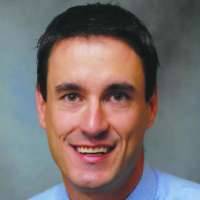
Scott M. Dehm PhD
Biochemistry and Molecular Genetics
Minneapolis, Minnesota, United States of America
Connect with the speaker?
Dr. Scott M. Dehm is a member of the Division of Molecular Pathology and Genomics. His research laboratory focuses on the role of the androgen receptor (AR) and alterations in AR signaling in prostate cancer development and progression. As they develop, nearly all metastatic prostate cancers remain dependent on androgens--male hormones of which testosterone is best known. Following treatment targeting the AR including anti-androgen drug therapies and surgical castration to prevent androgen production, patients typically develop resistance. Dehm studies the changes that occur in the AR in response to these drug therapies to understand the mechanisms underlying the progression to therapy-resistant disease. His work has revealed new ways in which cancer cells can re-activate the androgen/AR pathway. If these mechanisms are better understood, new AR-targeted therapies could be developed that suppress prostate cancer growth more effectively with more durable remissions.
Dr. Dehm’s research team employs a variety of genomic engineering, molecular biology, and biochemistry tools to home in on the regulatory behavior of the AR and the signals it uses to promote resistance. These tools are used to analyze clinical tissues, prostate cancer cell lines, models in which patient-derived tumor tissue is grown in mice (xenografts), and fresh surgical tissue that is propagated in the laboratory as explants. Dehm and his colleagues have found that altered protein forms of the AR, termed AR variants, can be synthesized in resistant tumors. These AR variants are missing the site of the protein responsible for binding to androgens, which is the same site to which anti-androgens bind. However, these AR variants retain all other parts of the protein that are required for binding to DNA and activation of transcription. Therefore, these AR variants are able to carry out most of the functions of the AR protein, but in a way that no longer requires androgens and is completely insensitive to anti-androgens. Dehm and his co-investigators are now focused on understanding how these AR variants are regulated, with the ultimate goal of finding ways to inhibit them.
Transcription factors like AR variants are challenging drug targets because key binding events occur via protein: DNA or protein: protein interfaces rather than through the lock-and-key mechanism of androgen binding to the AR, which medicinal chemists can more readily exploit. However, Dehm notes that recent advances in small-molecule design and peptide chemistry have overcome some of these challenges, and could potentially be applied to AR variants. Ultimately, identifying and targeting key processes required for AR variants to remain active in prostate cancer cells could provide an avenue to overcome the challenge of therapeutic resistance in patients.
Dr. Dehm’s research team employs a variety of genomic engineering, molecular biology, and biochemistry tools to home in on the regulatory behavior of the AR and the signals it uses to promote resistance. These tools are used to analyze clinical tissues, prostate cancer cell lines, models in which patient-derived tumor tissue is grown in mice (xenografts), and fresh surgical tissue that is propagated in the laboratory as explants. Dehm and his colleagues have found that altered protein forms of the AR, termed AR variants, can be synthesized in resistant tumors. These AR variants are missing the site of the protein responsible for binding to androgens, which is the same site to which anti-androgens bind. However, these AR variants retain all other parts of the protein that are required for binding to DNA and activation of transcription. Therefore, these AR variants are able to carry out most of the functions of the AR protein, but in a way that no longer requires androgens and is completely insensitive to anti-androgens. Dehm and his co-investigators are now focused on understanding how these AR variants are regulated, with the ultimate goal of finding ways to inhibit them.
Transcription factors like AR variants are challenging drug targets because key binding events occur via protein: DNA or protein: protein interfaces rather than through the lock-and-key mechanism of androgen binding to the AR, which medicinal chemists can more readily exploit. However, Dehm notes that recent advances in small-molecule design and peptide chemistry have overcome some of these challenges, and could potentially be applied to AR variants. Ultimately, identifying and targeting key processes required for AR variants to remain active in prostate cancer cells could provide an avenue to overcome the challenge of therapeutic resistance in patients.

